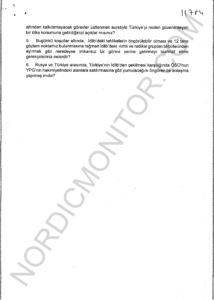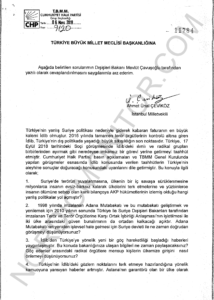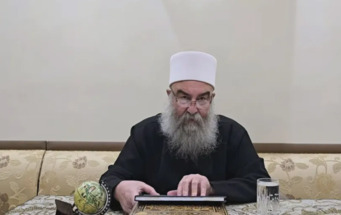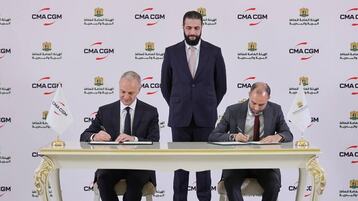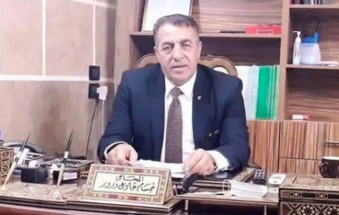-
Turkey, Russia signed secret deal on Idlib that allowed military offensive against Kurds

Ankara and Moscow signed a secret agreement allowing militia supported by Turkey to attack US-backed Kurdish fighters in Syria in exchange for Turkey abandoning Idlib, a senior opposition lawmaker in the Turkish parliament has claimed.
According to a parliamentary question, a copy of which was obtained by Nordic Monitor, Ünal Çeviköz, deputy chairperson of Turkey’s main opposition Republican People’s Party (CHP), Turkey and Russia signed a secret agreement allowing Turkish-backed Free Syrian Army (FSA) forces to attack areas controlled by Kurdish People’s Protection Units (YPG) in Syria. According to Çeviköz, a former ambassador, Turkey had to agree in return to withdraw its troops and military equipment from Idlib.
On May 6, 2019 Çeviköz submitted a parliamentary question asking Foreign Minister Mevlüt Çavuşoğlu if the claim was true. The minister declined to respond to the question, although he was obliged to provide an answer within two weeks, according to Article 98 of the Turkish Constitution.
Turkish-backed groups have simultaneously launched offensives in territory held by the YPG and seized some villages since 2018. This agreement might have forced Russia to remain silent during the attacks.
Çeviköz also accused the Turkish government of interfering in Syria’s domestic politics and sought information on a possible date for direct contact with Syria, security measures preventing terrorist groups from entering Turkey if they are forced to leave Idlib and the reason behind accepting the very difficult task of ensuring the separation of radical groups from moderate opposition groups in line with the Astana/Sochi process to resolve the Syrian conflict.
Since Turkey considers Kurdish forces terrorist groups and a threat to its national security, it has long threatened to unilaterally attack the YPG, which controls large swaths of northern Syria. To this end the Turkish government focused on gaining support from international actors in Syria for its military interventions. The US indecisiveness in Syria has pushed Ankara closer to Moscow. It appears that Turkey wanted to strike a deal on the Kurds with Russia, which could then cause the US to change its mind.
Çeviköz is believed to have picked up on the secret deal from his extensive contacts in the Foreign Ministry, where he had served for years and is well respected among members of Turkey’s foreign service.
A joint statement by the Turkish Defense Ministry and the US Embassy in Ankara on August 7, 2019 suggests that the US has been trying to counter the Russian deal. According to the statement Turkey and the US have agreed to establish a joint operations center in order to coordinate and manage the setting up of a safe zone in northern Syria. The US-Turkey agreement makes no mention of the size of the border zone nor the YPG presence in the area but acknowledges the Turkish government’s intent to return Syrian refugees to their homeland.
The latest Human Rights Watch (HRW) report revealed that Turkish authorities detained hundreds of Syrians and then deported them to Idlib and the northern Aleppo Governorate through the Cilvegözü/Bab al-Hawa border crossing. A new safe zone in northern Syria would provide Turkey an important opportunity to increase the forcible return of Syrians.
It is also possible that when Turkey withdraws from Idlib in line with the secret agreement, it could resettle radical groups who are forced to leave Idlib among Syrian refugees in the safe zone.
Idlib is the only large region in Syria that is still controlled by illegal armed groups. In May 2017 Russia, Turkey and Iran, the three partners of the Sochi process, agreed to establish de-escalation zones in Deraa, Eastern Ghouta, Homs and Idlib. Turkey did not volunteer to assume any responsibility in the first three de-escalation zones but was interested in Idlib. In the same year, a northern de-escalation zone was set up in Idlib to give shelter to militants and their families.
When the Syrian government prepared to launch an Idlib offensive, the Russian and Turkish presidents met in Sochi, on September 17, 2018, and their talks resulted in an agreement to establish a demilitarized zone in Idlib, which was to be 15-20 kilometers deep. Under that deal, Turkey deployed forces in Idlib at a dozen positions around the rebel-controlled northwestern province, where it has set up observation posts to prevent an escalation between Syrian government forces and rebels.
However, Turkey was accused of being too soft on and supporting Hayat Tahrir al-Sham (HTS), the latest incarnation of the al-Nusra Front, which was al-Qaeda’s official affiliate in Syria. It was Turkey’s responsibility to prevent those groups from conducting attacks on Syrian soil. In the months since the agreement was signed, Idlib has been taken over by the militants of HTS, and it has become one of the strongest militant groups in northern Syria. Today, HTS largely controls Idlib province, including the provincial capital and the border crossing with Turkey at Bab
You May Also Like
Popular Posts
Caricature
BENEFIT Sponsors BuildHer...
- April 23, 2025
BENEFIT, the Kingdom’s innovator and leading company in Fintech and electronic financial transactions service, has sponsored the BuildHer CityHack 2025 Hackathon, a two-day event spearheaded by the College of Engineering and Technology at the Royal University for Women (RUW).
Aimed at secondary school students, the event brought together a distinguished group of academic professionals and technology experts to mentor and inspire young participants.
More than 100 high school students from across the Kingdom of Bahrain took part in the hackathon, which featured an intensive programme of training workshops and hands-on sessions. These activities were tailored to enhance participants’ critical thinking, collaborative problem-solving, and team-building capabilities, while also encouraging the development of practical and sustainable solutions to contemporary challenges using modern technological tools.
BENEFIT’s Chief Executive Mr. Abdulwahed AlJanahi, commented: “Our support for this educational hackathon reflects our long-term strategic vision to nurture the talents of emerging national youth and empower the next generation of accomplished female leaders in technology. By fostering creativity and innovation, we aim to contribute meaningfully to Bahrain’s comprehensive development goals and align with the aspirations outlined in the Kingdom’s Vision 2030—an ambition in which BENEFIT plays a central role.”
Professor Riyadh Yousif Hamzah, President of the Royal University for Women, commented: “This initiative reflects our commitment to advancing women in STEM fields. We're cultivating a generation of creative, solution-driven female leaders who will drive national development. Our partnership with BENEFIT exemplifies the powerful synergy between academia and private sector in supporting educational innovation.”
Hanan Abdulla Hasan, Senior Manager, PR & Communication at BENEFIT, said: “We are honoured to collaborate with RUW in supporting this remarkable technology-focused event. It highlights our commitment to social responsibility, and our ongoing efforts to enhance the digital and innovation capabilities of young Bahraini women and foster their ability to harness technological tools in the service of a smarter, more sustainable future.”
For his part, Dr. Humam ElAgha, Acting Dean of the College of Engineering and Technology at the University, said: “BuildHer CityHack 2025 embodies our hands-on approach to education. By tackling real-world problems through creative thinking and sustainable solutions, we're preparing women to thrive in the knowledge economy – a cornerstone of the University's vision.”
opinion
Report
ads
Newsletter
Subscribe to our mailing list to get the new updates!

